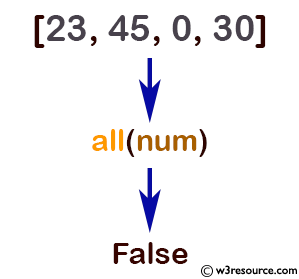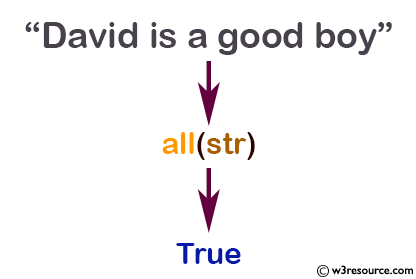Python: all() function
all() function
The all() function is used to test whether all elements of an iterable are true or not.
Syntax
all(iterable)
Version:
(Python 3)
Parameter:
| Name | Description | Required/ Optional |
|---|---|---|
| iterable | A container is considered to be iterble, which can return its members sequentially. | Required |
Return value:
Return True if all elements of the iterable are true.
Python: all() example with Lists
# all values true
num = [23, 45, 10, 30]
print(all(num)) #True
# all values false
num = [0, False]
print(all(num)) #False
# one false value
num = [1, 3, 4, 0]
print(all(num)) #False
# one true value
num = [0, False, 5]
print(all(num)) #False
# empty iterable
num = []
print(all(num)) #True
Output:
False False False False True
Pictorial Presentation:

Python: all() example with Dictionaries
dict = {0: 'False', 1: 'False'}
print(all(dict)) #False
dict = {1: 'True', 2: 'True'}
print(all(dict)) #True
dict = {1: 'True', False: 0}
print(all(dict)) #False
dict = {}
print(all(dict)) #True
# 0 is False
# '0' is True
dict = {'0': 'True'}
print(all(dict)) #True
Output:
False True False True True
Python: all() example with Tuple
#Test if all items in a tuple are True:
tup = (0, True, False)
x = all(tup)
print(x) #False
tup = (1, True, True)
x = all(tup)
print(x) #True
Output:
False True
Python: all() example with Set
#Test if all items in a set are True:
sss = {0, True, False}
x = all(sss)
print(x) #False
sss = (1, True, True)
x = all(sss)
print(x) #True
Output:
False True False True True
Example: Python all() function with Strings
str = "David is a good boy"
print(all(str)) #True
# 0 is False
# '0' is True
str = '000'
print(all(str)) #True
str = ''
print(all(str)) #True
Output:
True True True
Pictorial Presentation:

Python Code Editor:
Test your Python skills with w3resource's quiz
